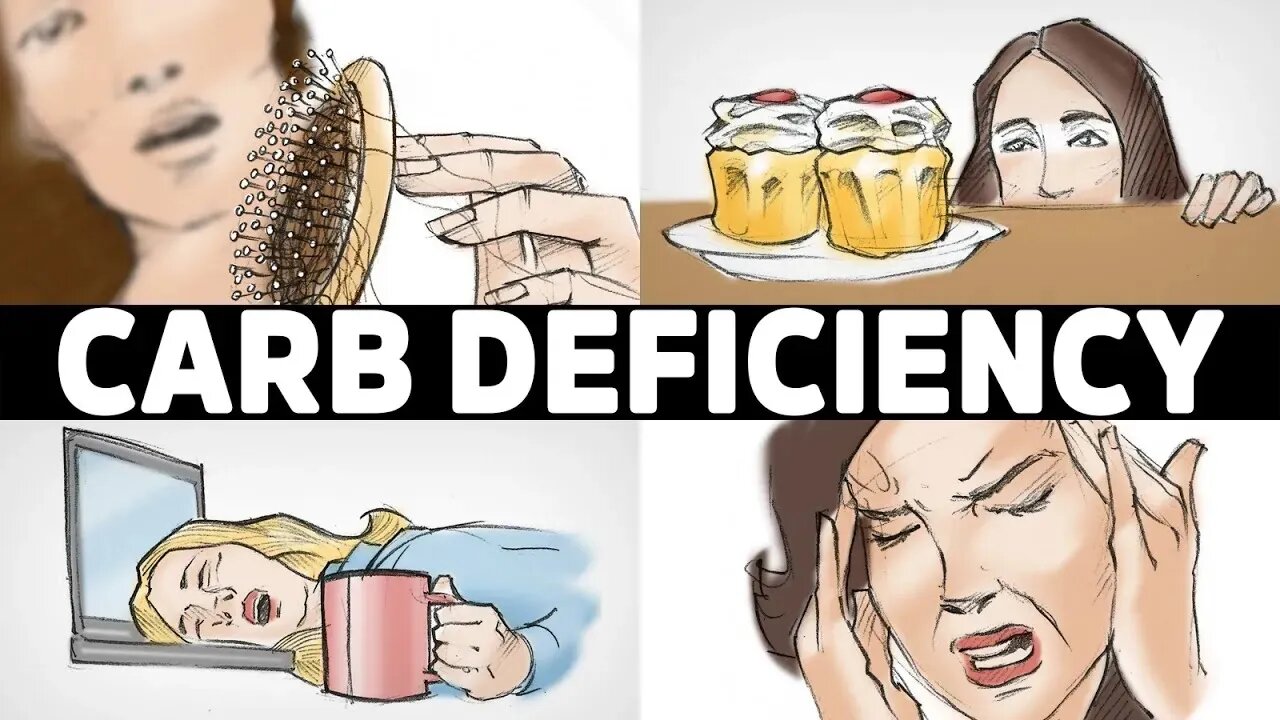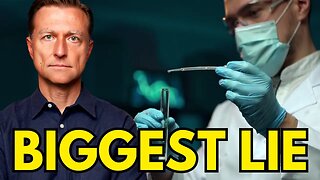Premium Only Content

The 9 Signs of a Carbohydrate Deficiency
Are carbohydrates healthy or not? Discover the top signs of carbohydrate deficiency.
0:00 Introduction: Are carbohydrates good for you?
0:25 Carbohydrate deficiency symptoms
2:58 The benefits of a carbohydrate deficiency
5:00 Tips for keto beginners
7:00 Learn more about the keto diet!
Let’s talk about carbohydrates. When you look up information about the symptoms or signs of carbohydrate deficiency, you’ll likely see the wrong information.
You’ll be told that our brain needs carbohydrates and that the body prefers glucose as fuel. You’ll also probably be told that cutting carbs out of your diet could lead to a lot of health issues.
Common misconceptions about what happens if you stop consuming carbs:
1. You’ll crave carbs and junk food
2. You’ll be hungry all of the time
3. You’ll experience brain fog and fatigue
4. You’ll have mood swings
5. You’ll be too tired to exercise
6. You’ll be constipated
7. You’ll get headaches
8. You’ll have bad breath
9. You’ll lose too much water and electrolytes
The real benefits of a carbohydrate deficiency:
1. No cravings
2. No appetite
3. Cognitive improvements
4. Improved mood
5. Better exercise performance
6. Better digestion
7. Fewer headaches
8. No bad breath
When you stop consuming carbs and start doing keto and fasting correctly, you can experience many incredible health effects.
Any carbohydrate that your brain requires can be made from non-carbohydrate sources like protein, fat, and ketones. Many potential issues that may appear with keto can also quickly be resolved. For example, you can take electrolytes as you lose water weight.
Keep in mind when you start doing Healthy Keto® that it's important to lower your carbs to 30 to 50 grams net carbs per day and to give your body time to get into ketosis.
Dr. Eric Berg DC Bio:
Dr. Berg, age 57, is a chiropractor who specializes in Healthy Ketosis & Intermittent Fasting. He is the author of the best-selling book The Healthy Keto Plan, and is the Director of Dr. Berg Nutritionals. He no longer practices, but focuses on health education through social media.
Follow Me On Social Media:
Facebook: https://bit.ly/FB-DrBerg
Instagram: https://bit.ly/IG-DrBerg
Anchor: https://bit.ly/Anchor-DrBerg
TikTok: https://bit.ly/TikTok-DrBerg
Send a Message to his team: https://m.me/DrEricBerg
Disclaimer:
Dr. Eric Berg received his Doctor of Chiropractic degree from Palmer College of Chiropractic in 1988. His use of “doctor” or “Dr.” in relation to himself solely refers to that degree. Dr. Berg is a licensed chiropractor in Virginia, California, and Louisiana, but he no longer practices chiropractic in any state and does not see patients so he can focus on educating people as a full time activity, yet he maintains an active license. This video is for general informational purposes only. It should not be used to self-diagnose and it is not a substitute for a medical exam, cure, treatment, diagnosis, and prescription or recommendation. It does not create a doctor-patient relationship between Dr. Berg and you. You should not make any change in your health regimen or diet before first consulting a physician and obtaining a medical exam, diagnosis, and recommendation. Always seek the advice of a physician or other qualified health provider with any questions you may have regarding a medical condition.
#keto #ketodiet #weightloss #ketolifestyle
Thanks for watching! I hope this helps you better understand the signs of carbohydrate deficiency. Check out my other videos to learn more about Healthy Keto.
-
 28:09
28:09
Dr. Eric Berg
4 days agoThey Lied to Us
11.2K44 -
 2:13:05
2:13:05
The Nerd Realm
17 hours ago $10.47 earnedNew Years Eve! Fortnite Hunters w/ YOU! Creator Code: NERDREALM
82.9K6 -
 11:04:44
11:04:44
FusedAegisTV
1 day agoNYE Eve! - 2025 Incoming 🎉 - 12hr Variety Stream!
143K7 -
 1:18:52
1:18:52
Awaken With JP
20 hours agoSomehow The World DIDN’T End This Year! - LIES Ep 72
177K93 -
 1:19:34
1:19:34
Michael Franzese
18 hours agoWhat 2024 Taught Us About the Future?
139K34 -
 1:48:09
1:48:09
The Quartering
18 hours agoBird Flu PANIC, Sam Hyde DESTROYS Elon Musk & Patrick Bet David & Woke Witcher?
144K104 -
 4:47
4:47
SLS - Street League Skateboarding
3 days agoLiz Akama’s 2nd Place Finish at SLS Tokyo 2024 | Best Tricks
65.4K6 -
 4:06:54
4:06:54
LumpyPotatoX2
17 hours agoHappy New Year Rumble ! - #RumbleGaming
47.9K1 -
 10:37
10:37
One Bite Pizza Reviews
1 day agoBest of Barstool Pizza Reviews 2024
72.2K33 -
 2:37
2:37
Tate Speech by Andrew Tate
20 hours ago2025 WILL BE YOUR YEAR
125K45